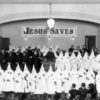The rather evocative title employed here most likely brings to mind a gathering akin to Westboro Baptist Church. Their unbiblical and indefensible behavior has made them worthy of such a description. But it remains true in most of the American church world that from 11:00-12:00 on Sunday morning remains the most segregated hour of the week. That reality prompts this question—Is that in spite of us or because of us?
I was heartened during a concert of prayer held at New Life a couple of weeks ago as we prayed prayers of identificational repentance. One of the first sins addressed was the sin of racism. Recognition of a problem is a necessary initial step. But as the pastor I am left wondering if that is an individual or a corporate recognition. We as a church give lip service to diversity, but there is little evidence among the chairs on Sunday morning.
Most of us have long moved past an understanding of racism that centers around the KKK and the issues surrounding the Confederate battle flag. There is a realization that a contemporary racism is far more implicit. It has to do with who we trust and who we don’t; whose success we are surprised at and whose success we expect. It might even raise its ugly head as we decide who is the victim and who is the culprit. How do we find ourselves responding to languages we don’t understand, foods we are unfamiliar with, accents we don’t approve of, and neighbors who are not like us?
I am a white, southern-born man who is married to a South American and we have two ethnically-mixed daughters who carry with them the implications of being raised in an intercultural home and the oldest of the two is married to an African-American man. It would be the height of naivete to imagine that these cultural and racial realities do not affect each of our stories and how we respond to all that happens around us. A kind of self-awareness is helpful as we analyze our reactions and opinions.
What about when the local expression of the body of Christ known as New Life Alliance Church comes together on Sunday morning—a gathering of multiple stories and experiences that have helped form a racial and ethnic response? Except this is a group that is called by the love of God and the grace of Christ to live out the numerous “one another’s” of the New Testament. Our purpose is to worship God in unity while we love, forgive, and encourage one another.
How, in the midst of that, is there any room for racial division, ethnic superiority, or a segregated faith?
What a tremendous picture is presented to us in Revelation 7: 9-10: “After these things I looked, and behold, a great multitude which no one could count, from every nation and all tribes and peoples and tongues, standing before the throne and before the Lamb, clothed in white robes, and palm branches were in their hands; and they cry out with a loud voice, saying, ‘Salvation to our God who sits on the throne, and to the Lamb.’”
Even in heaven around the throne there is ethnic, national, geographical, and linguistic diversity. If we are not careful we can begin to think it is better to erase these distinctives and blend into a monochromatic whole. We have probably heard someone say (or we have said ourselves), “When I look at my brother or sister I don’t see color.” That doesn’t make us accepting of diversity—it makes us colorblind. Every ethnic or racial group brings into the gathered body of Christ elements of diversity. I would call upon us not to ignore those things, but to celebrate them.
I trust we are and are ever more becoming that church where every expression of our cultural community is welcome here as we desire to increasingly exhibit what it means to be the Great Commission people of God.
